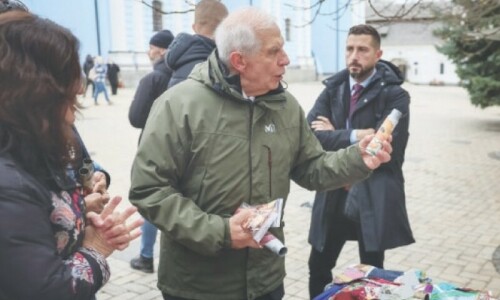MOSCOW, Sept 22: Russian warships set sail on Monday for manoeuvres in the Caribbean area calculated to demonstrate to the United States Moscow’s return as a global power on the military and political stage.
The exercises, drawing on a strong alliance with Venezuela’s anti-American President Hugo Chavez, will be closely watched by western navies as the first such projection of Russian power close to US shores since the collapse of the Soviet Union.
Navy spokesman Igor Dygalo said the nuclear-powered heavy missile cruiser Peter the Great and antisubmarine destroyer Admiral Chabanenko left their base near Murmansk with two support ships for the 15,000 mile passage to Venezuela.
Washington denounced Moscow for its crushing of pro-western Georgia in a brief conflict last month over two rebel provinces. Russia then expressed anger over the appearance of US warships in the Black Sea region which it considers its sphere of influence to deliver aid to Georgia.
Russia’s cultivation of leftist Chavez and renewed interest in Cuba and ports of call in the Middle East bear unmistakable echoes of the Cold War, when two superpowers vied for influence.
Dygalo declined to comment on media reports that nuclear submarines would participate in the exercises and that the warships would visit Syria, where Russia has signalled an interest in developing bases.
“During the trip the ships will take part in the first joint exercises with the Venezuelan navy aimed at training rescue drills and operations against sea terrorists,” Dygalo said of the mission, expected to last several months.
In the years after the fall of the Soviet Union, Russia’s once-proud armed forces, deprived of funding, declined rapidly.
Ships lacked fuel to put to sea, warplanes were grounded, troops neglected.
With the revival of the national economy and soaring oil revenues, Kremlin leaders poured money into the armed forces, as a symbol of revived national prowess; though western analysts say their fleet is still in great need of modernisation.
Earlier this month Moscow sent Tu-160 strategic bombers to Venezuela for what most analysts say was part of Moscow’s reaction to US deals to deploy elements of its missile defence system in Eastern Europe, close to Russia’s borders. Moscow regards the system as a threat to its nuclear deterrent, but Washington insists it is not aimed at Russian interests.
Russian media reported on Monday that the naval group could be larger and more heavily-armed than realised in the West and could make unexpected ports of call.
“The Russian warships will be followed by anti-submarine airplanes and nuclear-powered submarines with missiles on board,” Russia’s Nezavisimaya Gazeta daily said on Monday. It gave no further details.
Another Russian daily, Izvestia, said that on their way to Venezuela, the Russian flotilla will detour through the Gibraltar Strait and into the Mediterranean, where US navy vessels are also deployed.
—Reuters













































Dear visitor, the comments section is undergoing an overhaul and will return soon.